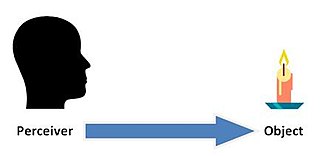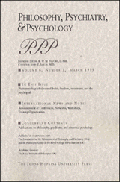Related Research Articles

Cognitive science is the interdisciplinary, scientific study of the mind and its processes with input from linguistics, psychology, neuroscience, philosophy, computer science/artificial intelligence, and anthropology. It examines the nature, the tasks, and the functions of cognition. Cognitive scientists study intelligence and behavior, with a focus on how nervous systems represent, process, and transform information. Mental faculties of concern to cognitive scientists include language, perception, memory, attention, reasoning, and emotion; to understand these faculties, cognitive scientists borrow from fields such as linguistics, psychology, artificial intelligence, philosophy, neuroscience, and anthropology. The typical analysis of cognitive science spans many levels of organization, from learning and decision to logic and planning; from neural circuitry to modular brain organization. One of the fundamental concepts of cognitive science is that "thinking can best be understood in terms of representational structures in the mind and computational procedures that operate on those structures."

The mind is the set of faculties responsible for all mental phenomena. Often the term is also identified with the phenomena themselves. These faculties include thought, imagination, memory, will, and sensation. They are responsible for various mental phenomena, like perception, pain experience, belief, desire, intention, and emotion. Various overlapping classifications of mental phenomena have been proposed. Important distinctions group them according to whether they are sensory, propositional, intentional, conscious, or occurrent. Minds were traditionally understood as substances but it is more common in the contemporary perspective to conceive them as properties or capacities possessed by humans and higher animals. Various competing definitions of the exact nature of the mind or mentality have been proposed. Epistemic definitions focus on the privileged epistemic access the subject has to these states. Consciousness-based approaches give primacy to the conscious mind and allow unconscious mental phenomena as part of the mind only to the extent that they stand in the right relation to the conscious mind. According to intentionality-based approaches, the power to refer to objects and to represent the world is the mark of the mental. For behaviorism, whether an entity has a mind only depends on how it behaves in response to external stimuli while functionalism defines mental states in terms of the causal roles they play. Central questions for the study of mind, like whether other entities besides humans have minds or how the relation between body and mind is to be conceived, are strongly influenced by the choice of one's definition.

A thought experiment is a hypothetical situation in which a hypothesis, theory, or principle is laid out for the purpose of thinking through its consequences.

Cognition refers to "the mental action or process of acquiring knowledge and understanding through thought, experience, and the senses". It encompasses all aspects of intellectual functions and processes such as: perception, attention, thought, intelligence, the formation of knowledge, memory and working memory, judgment and evaluation, reasoning and computation, problem solving and decision making, comprehension and production of language. Imagination is also a cognitive process, it is considered as such because it involves thinking about possibilities. Cognitive processes use existing knowledge and discover new knowledge.

John Henry McDowell, FBA is a South African philosopher, formerly a fellow of University College, Oxford, and now university professor at the University of Pittsburgh. Although he has written on metaphysics, epistemology, ancient philosophy, nature, and meta-ethics, McDowell's most influential work has been in the philosophy of mind and philosophy of language. McDowell was one of three recipients of the 2010 Andrew W. Mellon Foundation's Distinguished Achievement Award, and is a Fellow of both the American Academy of Arts & Sciences and the British Academy.
Information processing is the change (processing) of information in any manner detectable by an observer. As such, it is a process that describes everything that happens (changes) in the universe, from the falling of a rock to the printing of a text file from a digital computer system. In the latter case, an information processor is changing the form of presentation of that text file. The computers up to this period function on the basis of programs saved in the memory, having no intelligence of their own.
Associationism is the idea that mental processes operate by the association of one mental state with its successor states. It holds that all mental processes are made up of discrete psychological elements and their combinations, which are believed to be made up of sensations or simple feelings. In philosophy, this idea is viewed as the outcome of empiricism and sensationism. The concept encompasses a psychological theory as well as comprehensive philosophical foundation and scientific methodology.

In philosophy of perception and philosophy of mind, naïve realism is the idea that the senses provide us with direct awareness of objects as they really are. When referred to as direct realism, naïve realism is often contrasted with indirect realism.

Psychology is defined as "the scientific study of behavior and mental processes". Philosophical interest in the human mind and behavior dates back to the ancient civilizations of Egypt, Persia, Greece, China, and India.
Edmund T. Rolls is a neuroscientist and Professor at the University of Warwick.
Tyler Burge is an American philosopher who is a Distinguished Professor of Philosophy at UCLA. Burge has made contributions to many areas of philosophy, including the philosophy of mind, philosophy of logic, epistemology, philosophy of language, and the history of philosophy.

Philosophy, Psychiatry, & Psychology is an academic journal founded in 1993 and the official publication of the Association for the Advancement of Philosophy and Psychiatry (AAPP) which fosters close associations with the American Psychiatric Association. The journal focuses on the overlap of philosophy, psychiatry, and abnormal psychology. It aims to make clinical material accessible to philosophers while advancing philosophical inquiry into the area of psychology. It includes book reviews, original works, and a variety of special columns.

Philosophy of mind is a branch of philosophy that studies the ontology and nature of the mind and its relationship with the body. The mind–body problem is a paradigmatic issue in philosophy of mind, although a number of other issues are addressed, such as the hard problem of consciousness and the nature of particular mental states. Aspects of the mind that are studied include mental events, mental functions, mental properties, consciousness and its neural correlates, the ontology of the mind, the nature of cognition and of thought, and the relationship of the mind to the body.

Dan Zahavi is a Danish philosopher. He is currently Professor of Philosophy at University of Copenhagen.

Peter Carruthers is a British-American philosopher and cognitive scientist working primarily in the area of philosophy of mind, though he has also made contributions to philosophy of language and ethics. He is a professor of philosophy at the University of Maryland, College Park, an associate member of Neuroscience and Cognitive Science Program, and a member of the Committee for Philosophy and the Sciences.
Lawrence Shapiro is a professor in the Department of Philosophy at the University of Wisconsin–Madison in the United States. His research focuses in the philosophy of psychology. He also works in both the philosophy of mind, and philosophy of biology.
Personal identity is the unique numerical identity of a person over time. Discussions regarding personal identity typically aim to determine the necessary and sufficient conditions under which a person at one time and a person at another time can be said to be the same person, persisting through time.

Edward S. Casey is an American philosopher and university professor. He has published several volumes on phenomenology, philosophical psychology, and the philosophy of space and place. His work is widely cited in contemporary continental philosophy. He is currently Distinguished Professor of Philosophy at Stony Brook University in New York and distinguished visiting faculty at Pacifica Graduate Institute.
Stephen Andrew Butterfill is a British philosopher and Professor of Philosophy at the University of Warwick. He is known for his research on philosophical issues in cognitive and developmental psychology.
Naomi Eilan is a British philosopher and professor of philosophy at the University of Warwick, whose works concern consciousness, philosophy of mind, metaphysics and philosophy of psychology.
References
- ↑ "Christoph Hoerl". Google Scholar Citations.
- ↑ Hull, Louise (1 June 2004). "Time and Memory: Issues in Philosophy and Psychology". Australasian Journal of Philosophy. 82 (2): 363–364. doi:10.1080/713659824. ISSN 0004-8402. S2CID 170197915.
- ↑ "Christoph Hoerl". The Aristotelian Society. 2 February 2015.